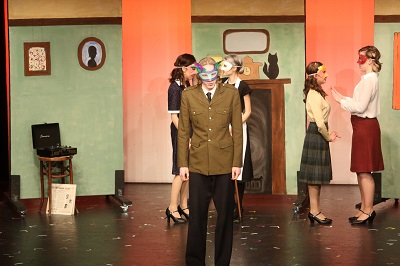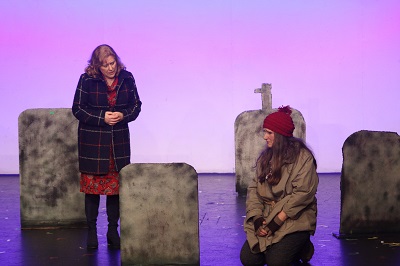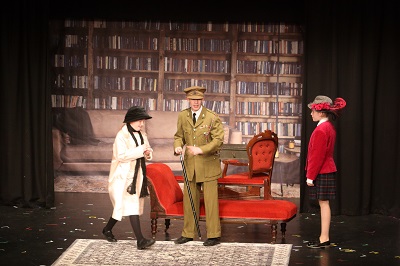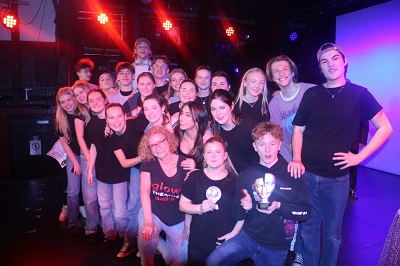
The
Barn Theatre,
25 Bluehouse Lane, Oxted, Surrey
RH8 0AA.
Tel:
01959 561811
Email: barntheatre
@btinternet.com

Southern Counties Drama Festival 2024
Click here to search this site
19th - 24th February
Andrea Oxlade (Host for the SCDF) introduced us to our Adjudicator for the week, Bob Tomson, who was making his first appearance at the Barn as Festival Adjudicator.
The plays in this year's festival were all of an extremely high standard. They benefitted from excellent feedback from the Adjudicator who also took time to informally chat with Directors and actors both before and after the shows which was greatly appreciated.
And so to the first of the plays...:
Monday 19th February
“Another Life” by Derek Webb performed by ACE Theatre Company
The week opened with this challenging play. The main character, Mary, has untreatable terminal cancer. She wants to die on her terms, rather than suffering a painful and undignified decline. She is therefore determined, to begin with at any rate, to take the one way trip to Switzerland for an assisted death. Christine White, as Mary, had to bear the full weight of this play, both in terms of the bulk of the lines but also to display and control the bulk of the emotional ups and downs. She managed this with great energy and drive. Her switches from abject despair, as she screams that she wants to die, to the joy of celebrating past good times with her husband, Douglas, were skilful and always convincing. The script required Douglas, played by Steve Gray, to be the weaker half of the marriage, and he was often tearful and almost pathetic in the face of Mary’s control and rationality. Gary Hunt and Karen Hunt did their best with what the script seemed to provide as rather wooden and unconvincing characters. They both doubled up on roles, which always makes it more difficult for actors to find an authentic voice. The cast had to manage a number of scene changes in the dark and this made for a little clunkiness. In the end, however, it was Mary’s strength of character that held her and Douglas together as she had second thoughts. “It’s my life” she proclaimed angrily and so it was.
“A Christmas Carol. The Creation of a Masterpiece” by Philip Porter performed by Oast Theatre, Tonbridge
Written by its Director, this piece imagines Charles Dickens, short of money, having to write A Christmas Carol in six weeks in order to bring in some much needed revenue. Backed by a vibrant and imaginative set that could be quickly adapted to suit every scene, including hat stands that carried the costume changes, Zac Thraves, as Dickens, gave a powerful and convincing performance, capturing the arrogance but also the hidden vulnerability of the great man. He was assisted by ‘Voice 1’ and ‘Voice 2’, who not only played all the other parts but provided narration to move us through the process of research, writing and then publicising the novel. Bizz Portlock, as Voice 1, was a stunning presence and moved smoothly from role to role – here a wretched and impoverished mother, there a sophisticated and smug lawyer – with great conviction and timing. With just a modicum of costume quickly donned – a shawl, a top hat – she became her characters in an instant, switching her voice and physicality most impressively. Tony Pegg, as Voice 2, provided great comic support, particularly when he played two plagiarists at once (Lee and Haddock) in a court scene. Sound effects were clever and the lighting effective, although when a spot was used, the two actors on view at that point at times failed to get both of themselves lit. All in all, this was an impressive performance played with great vigour and energy by all three actors.
Nomination for Best Adult Production
Best Adult Actor – Zac Thraves (Dickens)Tuesday 20th February
“Much Ado About Nothing” by William Shakespeare performed by Disaster Class
Condensing a Shakespearean play into a mere 50 minutes is undoubtedly a challenging task, yet Director Tabitha Crocker and her dedicated cast and crew executed it with commendable finesse. The decision to set the play in post-World War II 1940s added an appealing visual layer, with elegant costumes for the women, military uniforms for the men, and enchanting masks at the lively jitterbug ball.
Amelie Bardsley and Alfie Wickham, portraying Beatrice and Benedick, skillfully revelled in the delightful banter of their "merry war" of words. Evan Moynihan portrayed Claudio's journey from an impressionable youth to a heart-warming reunion with Alix Lander's sweet Hero. The gender swap for Leonata and Antonia, portrayed confidently by Lelia Prime and aging gracefully by Gia Hunter, added a refreshing twist to the narrative.
Elani Baldry delivered a poised performance as Margaret, and Dominic Semwanga brought a delightful swagger to the role of Don Pedro, showcasing not only his acting skills but also his talent in lighting design. George Adams and Ed Jones aptly embodied the roles of the scheming duo Don John and Barachio, while the audience revelled in the comedic antics of James Ali and Keiran O'Brien as Dogberry and Verges, reminiscent of the classic Keystone cops.
The production's simplicity, featuring three rotating flats and vibrant lighting on the cyclorama, created an engaging atmosphere, further heightened by the original music composed by Cameron Day. These talented young performers, aspiring to pursue full-time careers on the stage, demonstrated a remarkable level of professionalism that left a lasting impression on the audience
Nomination for Best Adult Production

“Last Woman Working” by Michael Pearcy performed by Betchworth Operatic and Dramatic Society
BODS skillfully tapped into a universal concern with "Last Woman Working." Tracey Hulf adeptly portrayed Barbara, who, in a familiar public surgery setting, confronted her local MP about the encroachment of AI and robots on jobs, including her own. Vanessa, played with entertaining flair by Linda Slater, and the appeasing MP Peter, played by Gerald Hulf, attempted to persuade Barbara to retrain. However, she resisted, leading to a comical incident where she handcuffed herself to Peter, much to the amusement of the audience, especially when Vanessa tried to intervene.
The Pickles, a somewhat caricatured couple of constituents, captured the incident and circulated it on social media. Barbara evolved into a spokesperson against AI, as highlighted by her dynamic daughter Linda, played by Kelly Cross. Protest placards effectively silhouetted against the cyclorama, emphasizing the growing movement. However, the narrative took an unexpected twist at the end when it was revealed that Peter was a robot all along.
While a couple of extended blackouts momentarily interrupted the flow of the play, the audience appreciated the potential implications hinted at by the production. "Last Woman Working" engaged with contemporary anxieties surrounding automation and artificial intelligence, offering a thought-provoking and entertaining exploration of the future of work.
Adjudicator’s Award to Stephen Tickell for stepping in to a part with no notice“Martyred Wives” by Margaret Wood performed by ACE Theatre Company
The decision to pair "Martyred Wives" with the preceding play proved to be an inspired choice by the organisers, drawing poignant parallels between the two narratives of women grappling with their circumstances in a changing world. In this compelling production, the men united in their pursuit of a fair wage, a theme accentuated by Colin White's emotive acapella folk songs, which powerfully underscored the injustice of the prevailing conditions. However, their collective efforts were met with a harsh sentence of seven years' transportation by the stern Judge, portrayed with conviction by David Burton.
The plight of the women left behind was ably depicted by Tanya Pemberton, Lynne Fallowell and Laura Shelly, under the capable direction of Viona Hopwood, who also took on a role within the cast. The period costumes added an authentic touch, allowing for a delightful moment of humour when Elizabeth revealed her unexpected haul of rabbits from beneath her skirt.
Betsey Loveless, Harriet Hammett, Diana and Elizabeth Stanfield, though less known today, played pivotal historical roles. The marches and protests triggered by their husband’s unjust treatment resulted in the men being known as the Tolpuddle Martyrs. Their collective strength and resilience were instrumental in shaping the foundation of the Trade Union movement. "Martyred Wives” stands as a poignant reminder of these women's fortitude in the face of unfair adversity.
Wednesday 21st February
“Baggage” by Bev Clark performed by Merstham Amateur Dramatic Society
The curtain opened to a simple but attractive set comprising a bench, a bus stop and a brightly lit cyclorama. Sandra, played by Nicky Gill, appears and delivers a monologue to the audience. This was skilfully done, with good variations in pace and tone. Annie, a ‘bag lady’, played by Imelda Smith, then enters pushing a supermarket trolley containing all her worldly goods. The trolley then became a useful prop, enabling Annie to fuss with its contents whenever she felt under pressure from her conversation with Sandra. Annie’s costume was suitably eccentric and grimy and her Dublin accent, whether it was natural or contrived, sounded authentic. As she challenges Sandra to describe her life, Annie showed good comic timing and posture. The script called for a lot of exposition, as both in turn told their life stories, and this limited the opportunities for dramatic interaction but the second scene, with a clever representation of a graveyard, led to opportunities for heightened emotion around Annie’s daughter’s grave. If performed again, attention might be given to ensuring that some of Annie’s lines did not get lost as her grief turned to near hysteria. This was a touching piece in which two women with apparently nothing in common in the end found mutual support and respect.
“Heaven’s Above” by Diana Raffle performed by The Mitre Players
Once again, death was the theme of this piece but (mercifully!) this time as a context for a highly amusing and clever comedy. We are in the anteroom to Heaven, attractively conveyed by blue sky and white clouds lighting the cyclorama and a few puffs of white smoke downstage. Larry, played with enormous comic gusto by Warwick Jones, is the supercilious bureaucratic gate keeper (St Peter being busy dealing with a rush in Woldingham!) trying to process three candidates for Paradise who would prefer not to be dead and instead be returned to Earth. Larry first has to deal with Sally (played by Nicky Chambers), who initially refuses to accept she is dead, suggesting it is all an anaesthetic induced dream. The back and forth between these two showed good comic timing and delivery. Melvin (David Morgan) had a heart attack as he was serving in a tennis match and he has ended up at Heaven’s Gate still clutching his racquet. David’s was a jewel of a character performance, engaging and entertaining the appreciative audience with every word and gesture. Bernice had had a miserable life and had committed suicide and, played by Julia Gibbs, skilfully showed us her anxiety and tension through her physical movements. The cast used the stage well, creating dynamism through their movements, and the humour never sagged. Eventually, Larry finds sufficient ‘clerical errors’ to enable him to bend the rules and have all three returned for a second chance at life, to the audience’s evident delight.
Jill Perry Award for Best Adult Actress – Nicky Chambers (Sally)
Best Adult Production
“Past Perceptions” by Andy Taylor performed by Oast Theatre, TTAC
The curtain opened to a stage empty but for four chairs, on which sat the four actors, the two not present for the opening action facing away from the audience. A married couple, James and Mary (played by John Ewens and Lynn Short) debate James’ questioning of the veracity of memories. While he is philosophical, she is down to earth and rational. Although they profess their love for each other, there is a noticeable lack of chemistry between them. They are interrupted by a strange visitor, Chris (played by the piece’s author, Andy Taylor). Chris exudes a controlled menace, overlaid with a veneer of insincere politeness, as he reveals, in an increasingly manic display, his claimed involvement with James’ long dead first wife, Siobhan. As the tensions between the three heighten, Chris then professes that he is in fact the father of Julie, a daughter born to Siobhan when she was married to James. When Julie, now an adult, appears and rejects Chris’ attempts to bond with her as a father, tempers mount and a fight occurs between James and Chris that appears to result in a heart attack for Chris. Incongruously, Julie then finishes him off by suffocating him with her scarf and proposing that they bury him in the garden. Although the audience had been held by the tension of the plot as it was step by step revealed, they seemed a little baffled by the ending. Nevertheless, we were left feeling suitably unsettled by Chris’ evil presence.
Nomination for Best Adult ProductionThursday 22nd February
“(Circle Dreams Around) The Terrible Terrible Past” by Simon Longman performed by LCA Stage Academy
As an ensemble piece of physical theatre, this play enabled each of the ten actors to have an interesting and entertaining part to play – and entertain it did. Someone has a recurring dream. It’s a bit weird. There are fish, chickens, cows, who all look and sound like people – people who look kind of familiar. A careers advisor is so stuck in Victorian times that he can only advise students to make candles, climb chimneys or go down mines. The past is forcing its way inside so the future looks like the past . And there’s a butcher, killing people. The dream feels like a circle – going round and round and back to the start again. And there doesn’t seem to be any way out.
Confused? Yes of course. All dreams are confusing and this play exploits that to the max but then take a step back and suddenly we understand that this is about teenage worry about their futures and what jobs they’ll be able to do. They worry about whether eating meat is ethical and if being a butcher is an acceptable career. They worry about why they haven’t been invited to a party and what they may have missed out on. They question some of the fundamentals of life itself – everything from ‘Is a crab a fish?’, to ‘Who should I love?’
The production, led by Director Matthew Harris, featured a disciplined and committed cast, particularly actors 1, 2, 3, and 4, played by Samuel Gower, Niamh Davis, Livee-Rae Turner and Jacob Gower who stood out with confident performances. Asher Byrne, Emmy Vince, Amara Hughes, Charley Berbuto, Hanna Fletcher and Thomas Prebble played all the other characters. The use of sound, from exploding planets to voiceovers, and the effective minimalist costuming, including the impactful hoodie action, contributed to the slick production. Overall, Harris, the crew, and the dedicated cast delivered an evening of surreal inventiveness, providing the audience with an enjoyable and engaging experience.
Nomination for Best Youth Production“Jessie’s Tree” by Bev Clark performed by Glow Theatre Group
The play began with an impactful thunderstorm created by sound engineer Dom Palmer, as the titular tree was struck by lightning. The representation of the tree stump with pallets and boxes could have been more effective, but Caitlin Daly's sweet, energetic Jessie, who memorialised her brother Jack with carved initials on the tree, set the motif spanning the 20th century.
In spring 1940, Jessie's children, Bob and Margie, encountered evacuees Ivy and Ralph by the old tree. Nathaniel Smith brought amusing belligerence to Bob, while Thea Stokes effectively played Ralph against gender expectations. Emily Hallet showed Margie to be every inch a '40s girl, and she and Ivy formed a firm friendship amid the conflict.
By summer 1967, Romilly Luck enjoyed portraying the changing customs as Pete, attempting to lead Margie's son Stevie astray after Jessie's death. Emily Stanley sensitively played Lorna, supporting Stevie through his loss and there was a lovely moment as the burnt-out tree began sprouting new shoots.
In 1999, the friends celebrated Halloween by the old tree. Amelia Rye elegantly played Jess, Steve and Emily's daughter, discovering more of Jessie's history through a special gift from Carl, a young Polish boy effectively portrayed by Matilda Herd.
Spanning four time periods, this charming play allowed the cast to explore diverse characters with inventive use of costumes and set design. The young directors Ed Cowlard and Emma Burton ensured the 18-strong cast delivered commendable performances, although the final duologue was disappointingly staged far upstage.
Friday 23rd February
“Ghostwriter” by NJ Warburton performed by Heathfield Youth Drama
This was a charming piece delightfully performed by a young and enthusiastic cast. Two playwrights are struggling to complete their script, a classic country house murder plot. The setting is a study, which doubles as both the place where they write and where the fictional murder will take place. The actors in their play appear and begin to act out the murder scene. However, they are not inclined to follow the script. They debate with themselves whether a character should be described as naughty, bad or diabolical, finally settling on wicked. Their costumes were imaginative and contributed to the overall humour. Our playwrights are driven to near distraction as then the director appears to impose her ideas and further depart from their script. Mr Cash Flow (the producer) wants music (“people come to see music!”). Further disruption is provide by an anarchic touch when a gaggle of escaped convicts rush through the stage, pursued by the police. All this is delivered by a great sense of comic timing by all the cast but the crowning episode of hilarity comes when there is a late arrival of “audience members” who are disruptive and loud. They have to be chased out of the theatre by Geoffrey, one of the increasingly irate playwrights. Shakespeare appears as a ghost writer. He offers to help them out but rewrites the lines in blank verse and has all the characters die from the sword or poison in a fittingly manic climax. This was a joy to watch and provided a warning to all playwrights to beware interference in the integrity of their script!
“Make Me Invisible” by Bev Clark performed by Glow Theatre Group
This was staged with just three cubes as ‘furniture’ but the dynamism of the cast’s movement meant that the stage never looked empty. ‘Older Boy’ (played by Sam Church) gave a highly mature, competent and at times moving performance as the Narrator, taking us through the story of how, as his younger self, he was cruelly bullied at school and his strategy for avoidance by becoming “invisible”. ‘Younger Boy’ (Drew Patterson) displayed good emotional technique as he was subjected to miserable treatment. “You’re only good for bullying” and “someone’s got to be the victim” were cruel taunts. The Ensemble all played their parts well, most effectively when the bullies acted out the (limited) careers they might go on to as adults. Standing out from the Ensemble was Alice Bennett as ‘White Gull’, whose stage presence and controlled and expressive movement was noticeable. Although this disturbing and eventually tragic story was well acted, this reviewer was left wondering whether the script had drifted at times from drama to polemic in its desire to expose the impact of feral like bullying. Nomination for Best Youth Production
Best Young Actor – Sam Church (Narrator/Older Boy)“The Terrible Fate of Humpty Dumpty” by David Calcutt performed by Heathfield Youth Drama
It was unfortunate that this piece immediately followed Make Me Invisible on Friday evening, since it ran a similar theme portraying the cruelty and misery of school bullying. The play opens with an enactment of the final moments of the life of the bullied boy, Terry Dumpton, meanly nicknamed Humpty Dumpty by the bullies, as he is incited by the malevolent gang to climb an electricity pylon to retrieve a Frisby deliberately thrown up there, only to be electrocuted and killed. The play then takes us back to the beginning and shows the progression of his treatment and the aftermath of his death as investigated by the police. Only Sammy (sensitively played by Theo Walker) voices any true remorse at the death of his friend, Terry, but he is shown to have been too weak to have stood up for Terry beforehand. Eventually, however, he has the courage to be the only one to tell the truth about what happened. Tom Cassidy gave a strong performance as Terry, whose compliant character frustratingly meant that he never stood up to the bullying, thus making himself even more of a target. In the end, it became hard to feel empathy for someone who made no attempt to escape the victim role. The bullies were disturbingly frightening, particularly their leader, Stubbs (Charlie Wilshire). This was an unmitigated piece. There were no heroes: evil triumphed over good. It was a tough watch.
Saturday 24th February
“Hamlet” by William Shakespeare (Abridged by Julia Ascott) performed by Glow Theatre Group
There was a strong visual opening to this gallop through the plot of Hamlet, with a synopsis in the programme for those in the audience not familiar with the work. Strong red and blue colours lit the dancers as they showed us the wedding of Claudius and Gertrude to modern music. The lyric of ‘I’m Only Human’ echoed Hamlet’s dilemmas to come. An imaginative use of cubes, quickly repositioned through the play to illustrate different scenes, enabled the production to keep up good pace and for the cast to have plenty of space to move. Vienne Punjani, playing Hamlet, mastered her lines well and was animated enough to indicate that she understood the emotions that lay beneath them. Tessa Wilkinson, as Ophelia, also injected emotion and energy to her role and was convincing in her final descent into madness. In the ‘play within the play’, the players were cleverly masked and they mimed the poisoning of Hamlet’s father with great visual impact. The Gravediggers found the required humour in their roles. This was by its nature a challenging piece to be delivered by such a young group and they were helped by the device of having narrative explanations of the development of the plot as we went along.
“Trauma” by Ethan Thorne performed by Serenity
Ethan Thorne's ambitious production, where he took on the roles of both playwright and director while embodying a pivotal character, delivered a thought-provoking and intense theatrical experience. The play masterfully portrayed the unravelling mental state of an undercover policeman, entangled in the web of betrayals, friendships, and the consequences of his choices.
Thorne, in his portrayal of Mark, the freedom fighter, showcased integrity and meticulous attention to detail, down to the nuanced tapping foot that added depth to the character. The ensemble cast, including Bailee Sheldon, Ellie Mae Allen, and Alexander Moloney, brought versatility and emotional resonance to their respective roles, navigating the complexities of morality and the human psyche.
The sensitive handling of dark themes, such as torture and mental health struggles, was a testament to the production's commitment to depth and authenticity. Moloney's portrayal of Jimmy, descending into PTSD and culminating in a poignant suicide scene, was handled with sensitivity and involved other characters, mitigating the potential shock.
Behind the scenes, Sarah, Ethan's mother, operated the sound effects, adding another layer to the production with notable touches like the heartbeat effect. Aidan Keogh, the stage manager, skillfully managed the simplistic multi-locations, contributing to the seamless flow of the play.
While the serious nature of the narrative dominated, the suggestion of a lighter touch during the bus scene offered a welcome contrast, which could perhaps have been made more of to provide the audience with a respite from the weighty themes explored throughout the play.
In summary, Thorne's production successfully wove a gripping narrative exploring morality and mental struggle. The ensemble's strong performances, combined with thoughtful directorial choices and technical expertise, made this play a commendable and immersive theatrical experience.
Nomination for Best Youth Production“The Story of Kylie and Rick” by Tony Layton performed by Glow Theatre Group
Director Jo Morrison, along with Christopher Backway, took an innovative approach to storytelling in this production, blending ensemble choral work and physical theatre to breathe life into the narrative of two disaffected teenagers facing unexpected responsibilities. Imogen Spenser and Charlie Smith, portraying Kylie and Rick respectively, skillfully dealt with a stolen car that unexpectedly held a baby, forcing them to confront the realities of adulthood.
Spenser's portrayal of Kylie was a standout, radiating attitude and sass while skilfully depicting the influences that led her to reject societal norms. Smith's masterful depiction of Rick conveyed street bravado and a burning desire to be someone.
The versatile ensemble enriched the production with choreographed set pieces, enhancing the visual appeal and contributing to the overall narrative. The slow curtain opening to a tableau of a car crash, symbolizing the tragic end of Rick and Kylie's lives but sparing the baby, added a poignant touch to the storytelling.
Among the 17 strong ensemble, Connie Macmillan shone as the grieving mother, delivering a compelling performance with a clear voice that captured the agony of loss. Rosie Butler's portrayal of Mrs. Parker exuded cheerfulness, while Amelie Torre impressively took on the role of a police officer managing a classroom of bored kids.
The incorporation of set pieces, such as the Spice Girls tribute, the posh ladies, and a group of MPs, added delightful diversity to the production. However, the estate women's grouping fell slightly short due to costume choices that unfortunately gave them a zombie-like appearance.
The production, with Jackie Driscoll as the Stage Manager, showcased excellent stagecraft, bold ideas, and seamless scene changes, creating a dynamic and enjoyable theatrical experience. The use of music by Dom Palmer as the Sound Technician was integral to enhancing the overall atmosphere, contributing significantly to the success of an evening filled with engaging storytelling and memorable performances.
Overall, Director Jo Morrison and Christopher Backway's vision materialised into a production that left a lasting impression on its audience.
Nomination for Best Youth Production
Best Young Actress – Imogen Spencer (Kylie)Saturday 24th February
“Chaos” by Laura Lomas performed by Glow Theatre Group
First Laura Lomas' play Chaos is a stream of scenes, both connected and disjointed. Many different teenage characters search for meaning in a complex and unsteady world. Bouncing through physics, the cosmos, love and violence, Seniors 1 of Glow Theatre Group took the audience on a journey to find order from disorder.
This talented group of young actors worked brilliantly together to engage the audience in a wonderfully energetic, well executed piece of theatre. The set, props, costumes sound and lighting were all instrumental in allowing the production to lead seamlessly from one scene to the next. The elements of physical theatre, dance and ensemble were used to excellent effect. During every scene the actors on set were completely focused and ensured their timing was perfect. The emotive monologues, comedic moments and contrasting moments of calm and chaos gave the audience an insight, or reminder, of the complex and difficult transition from youth to adulthood.
Jackie Driscoll’s direction was exciting and innovative and gave each member of the cast a moment to shine; no mean feat with a group of this size.
Best Stage Presentation
Martin Patrick Award for Best Director – Jackie Driscoll
Best Youth Production
VERLINGUE FESTIVAL WINNERS AWARD
“Missing” by Reza de Wet performed by Sevenoaks Shakespeare
Missing is a dark, slightly mysterious drama set in 1936. We are introduced Miem and Meisie, a mother and daughter living in poor conditions, on a night when the circus has come to town and the fear of previous, unsolved abductions of young girls hangs in the air.
The set presented to the audience gave the impression of a family living in reduced circumstances and the women were engaged in the tedious work of sewing sacks. Gertie, an unmarried teacher arrived, claiming to be too frightened to stay alone. Shortly afterwards they are startled by the unexpected arrival of a blind constable and the uneasy feeling grows.
Heather Wane, playing Miem, gave a strong and interesting performance of the mother, alternating between tenderness to dominance towards her daughter Meisie, played by Lara Lawman. Laura showed Meisie’s timid and vulnerable nature by good use of facial expressions and reactions to her mother’s instructions. The arrival of Gertie, lightened the mood and added some humour with Elizabeth McCreadie’s entertaining portrayal of the spinster PE teacher. The atmosphere became sinister once again when the Constable, played by Pierse Stevens, entered with a dark and brooding presence.
As the production unfolded, the audience were left to wonder if the unseen husband could be the one responsible for the abductions, or, was the Constable really who he professed to be and were any of the women really safe that night? Sandra Barfield, the Director, tightened the suspense gradually as the play progressed, only revealing the villain as the play ended.
Reviews by Morven Rae, Peter Shore & Teresa Chinnock
Photos by Mike Sutton




